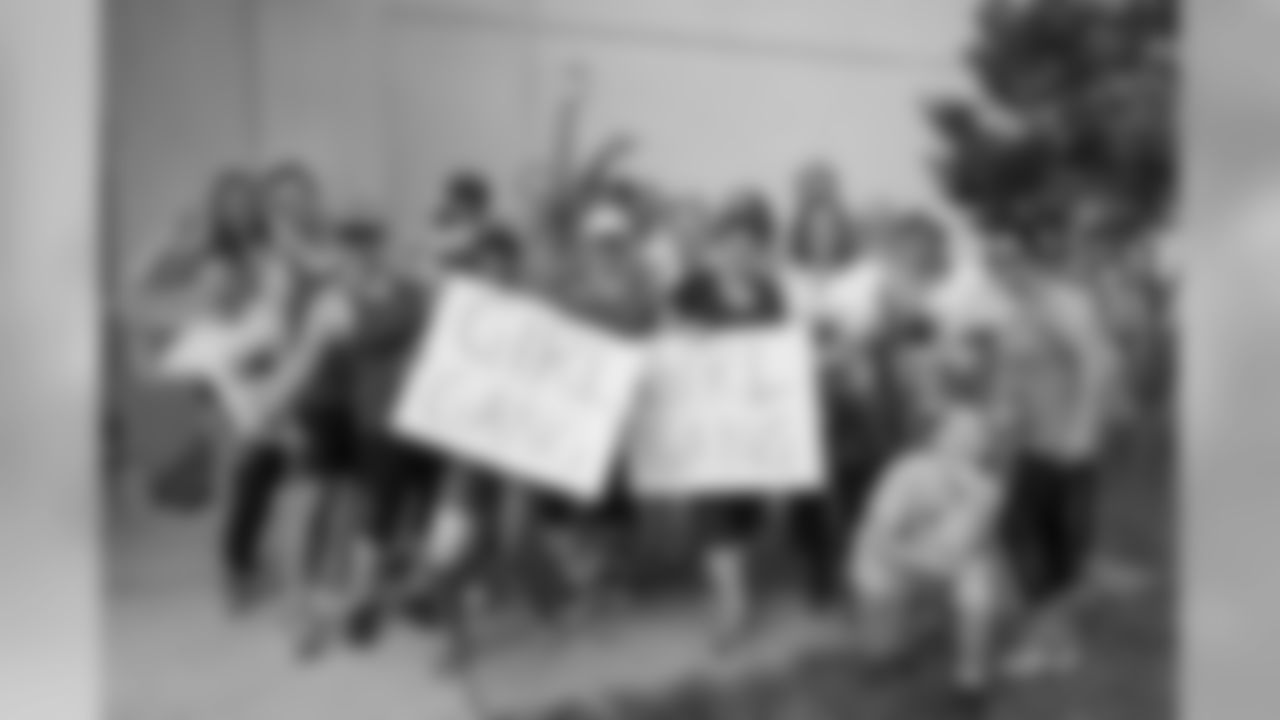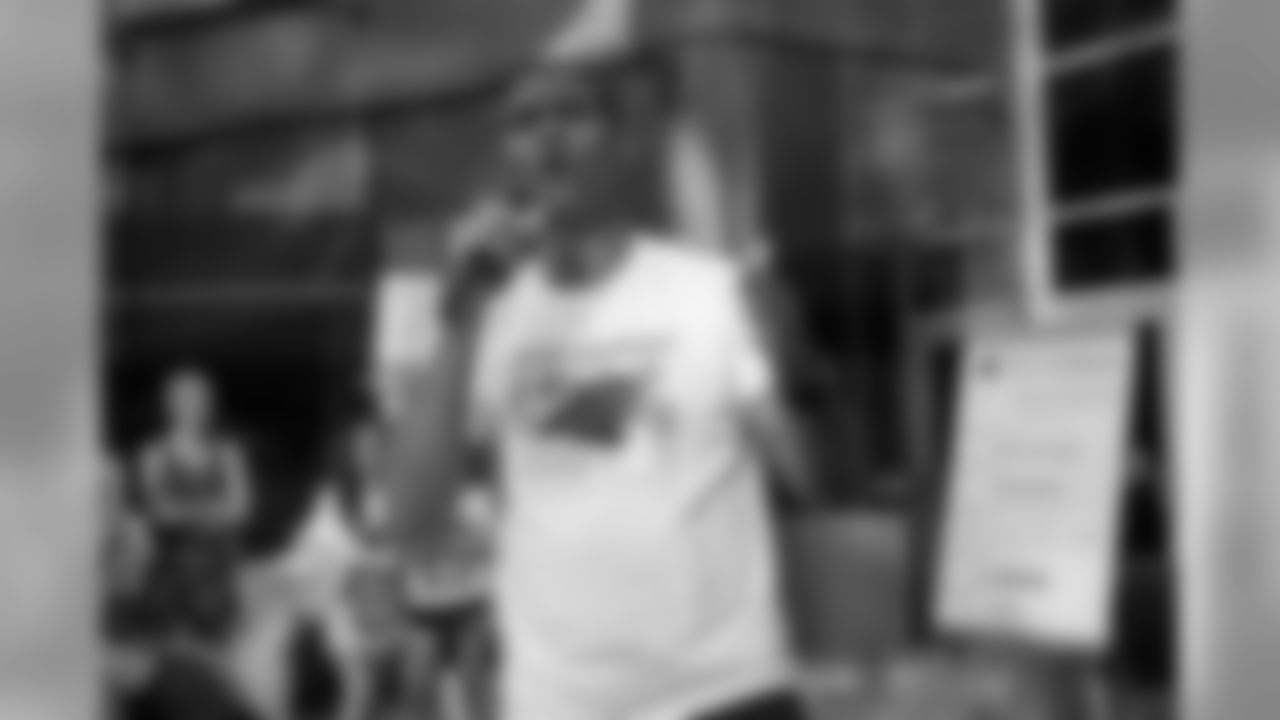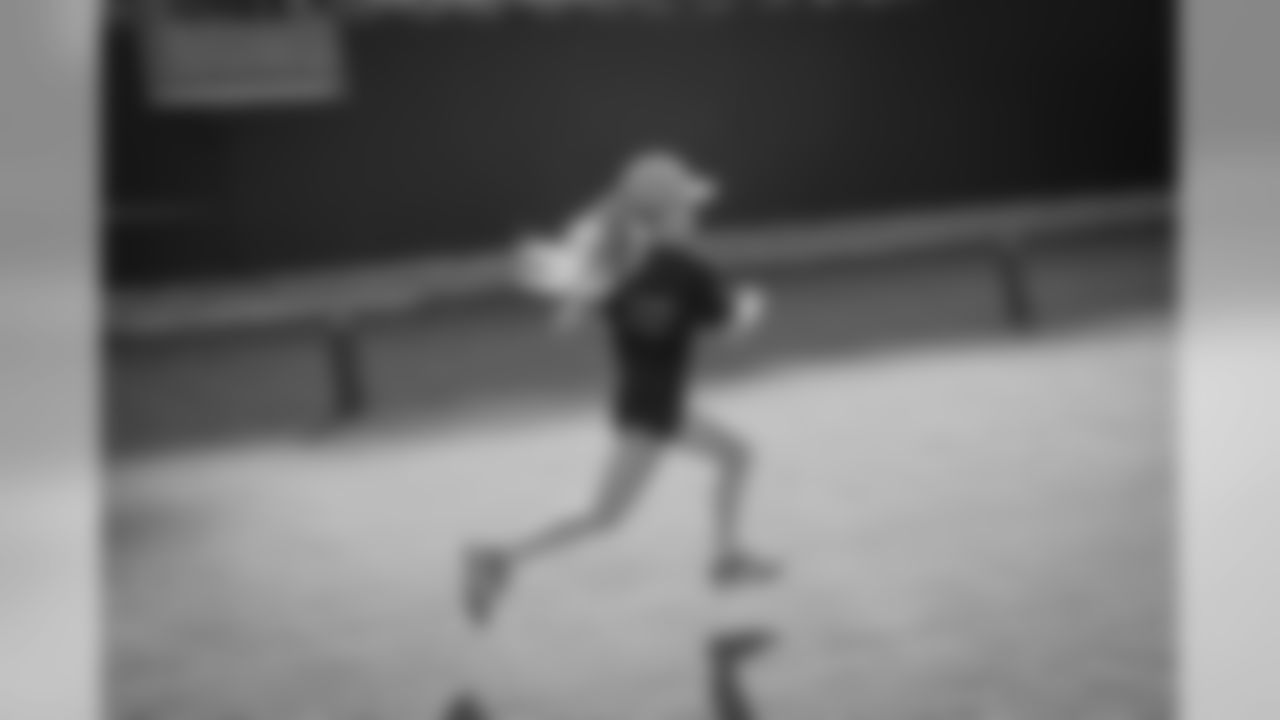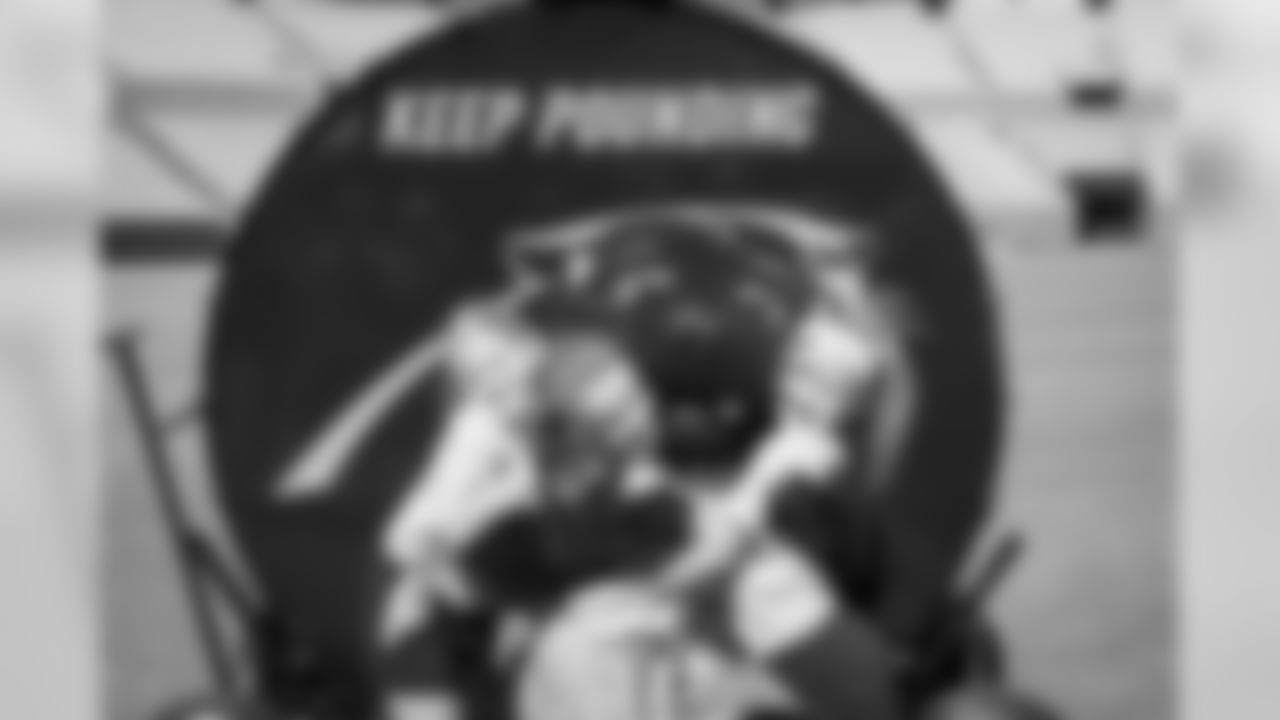Sam Mills never intended for his words, though carefully chosen, to end up becoming such a huge deal for the Carolina Panthers.
But those who knew him best believe that Mills would be proud that the phrase he coined in a pre-game speech – Keep Pounding – has become a rallying cry and a call to action for all of Panthers nation. Mills, then undergoing treatment for terminal cancer, first implored the team to "keep pounding" prior to a playoff game vs. the Dallas Cowboys that started the postseason run to Super Bowl XXXVIII in 2004.
The story behind the speech and how the centerpiece of it evolved into what it is today may not be quite what you think.
"It's taken on a unique life of its own since when he said it," said his son, Sam Mills III, who is now Defensive Line/Game Management coach with the Panthers. "When he said it, it really wasn't intended for public consumption, to be honest with you. It was meant for the team. He was talking to the team about his fight, and about their fight on and off the field.
"When he passed shortly thereafter, it kind of started taking on a life of its own. It just showed how powerful that message was. It's powerful within our organization, and it's since reached out to our city and even throughout the Carolinas now. It's been satisfying to watch it grow, to know where it came from, to know the meaning of it and now to see it put in action by our team and our fans."
One player who was in the team meeting room the day Mills gave the speech was wide receiver Ricky Proehl. He said he remembers what Mills said almost verbatim to this day.
"It was profound, to say the least," Proehl said. "He talked about when he was diagnosed. When the doctor told him he had cancer, he kind of stood there for a second in shock. It was one of those deals where he said, 'Oh, my God. They gave me three months (to live).'
"They give you three months, that's a death sentence. Your first thought is, 'I'm done.' He said he was devastated, but he started treatments and it was tough. But he said, 'You know, I kept fighting and I would come to work and everybody said I was an inspiration. I want to tell you one thing right now. This football team has been an inspiration to me.' "

Proehl said that at that point, Mills had the attention of everyone in the team meeting room – if he hadn't already grabbed it earlier. Mills went on to tell the players the story of how an improbable win over Tampa Bay earlier in that 2003 season had been pivotal for him in his fight against cancer.
"We led the game most of the game," Proehl recalled. "And Tampa Bay scores with no time left on the clock. All they had to do was kick the extra point to win. For him and everybody else in that stadium, they think it's game over. They win. I mean, it's an extra point. But we block it and we go to overtime and we win.
"He said, 'That was the turning point for me. You guys inspired me. When all odds were against you, you kept fighting. You didn't give in. You didn't quit. You blocked that extra point and you went on to win the game. That's what inspired me to keep pounding."
Keep Pounding. In little ways throughout that run to the NFC championship and the Super Bowl that season, Mills implored, mostly by example and by parsing his words carefully, the Panthers to do just that.
Quarterback Jake Delhomme said he remembers sulking a bit in the days following a November loss at Dallas that season.

"I got hit pretty good in that game. That was on the old Astroturf in Dallas. It took a little while to recover," Delhomme said. "I vividly remember that following Wednesday, which was the beginning of our work week, leaving the weight room to walk to the practice field. The body's hurting, it's starting to get a little colder. That was my first season starting, so the hits were starting to add up a little bit. It's getting to that point of the season where it's becoming a real grind before you make that December push.
"I remember processing the game plan, it's getting a little chilly, the body's hurtin'. I was kind of by myself and I guess my body language wasn't the best. I wasn't my normal somewhat upbeat self. And I remember Sam jogging past me on the way to the practice field, patting me on the behind and saying, 'All right, Big Jake, let's see if we can get better today and go beat so-and-so.' "
At the time, Mills was barely 48 hours removed from his latest chemotherapy treatment. The brief exchange shook Delhomme from his moment of self-pity and brought him back to reality.
"Here you are, processing a new game plan, a little cold, body hurting, and this guy who has terminal cancer, he's dying, he's going through chemo and radiation, and he's running out onto the field for practice with this positive attitude – and of course he's going to run about 10 100-yard sprints before practice, and then he's going to coach. And here's a man who's terminal. That was the moment when I realized that this man embodies everything that I just want to try to be like," Delhomme said.
"And that was the whole 'Keep Pounding' mantra. It wasn't just something he said. It was something he lived. And then when he talked to the team before that (playoff) game, he brought that up. Every play, keep pounding. That was him. It just kind of embodied what we became and in essence, the Carolina Panthers motto to this day."
Delhomme said the personal experience he had with Mills at that time was not unique to just him. He and Proehl – and others in the organization at the time – confirmed that Mills' positive attitude throughout what became a prolonged battle with cancer was infectious and that Mills, without appearing to go out of his way, made many such motivational one-on-one visits with players and front-office personnel that season and into the next.
Mills even met with a small group of the media for an emotional interview. But he didn't like to leave anyone in tears or feeling down.
"The day-to-day deal, unless you witnessed it, you would almost find it hard to believe," Proehl said. "You hear the horror stories of the cancer treatment and what it does to you. You hear about people getting treatment on Monday and they're laid out all week. They get back on their feet around the end of the week and then they feel OK until the next time they get it done, and then it zaps them again.
"To see him get treatment on Monday and be back out there on the practice field on Wednesday, it was hard to feel sorry for yourself, bitching about having to go to practice to do something you get paid to do that you grew up loving doing. It put things in perspective in a hurry."
Bruce Speight, who worked in the Media Relations department then and now is Manager of Social Engagement and Alumni Affairs for the Panthers, added: "The dude was just awesome. You had so much respect for him – and this may sound weird – but you had so much respect for him that to feel sorry for him or pity him because of his situation would be to dishonor who he was and what he stood for. So you tried to take great pride in trying to maintain an environment where there was normalcy, where nobody was dwelling on what he was going through, no one was hanging on that. You were determined to create normalcy out of respect for him.
"We all loved him so much that when he was with us, we did everything we could to just focus on the moment."
So everyone kept pounding. It was what Sam Mills wanted.
He ended up outliving the doctors' original prognosis by 17 months. One month after giving his infamous speech, he was on the sidelines for Super Bowl XXXVIII, coaching his linebackers.
It wasn't until April of 2005 that he finally succumbed to the disease at age 45. But the "Keep Pounding" legacy he started was only in its infancy.
The Carolina Panthers teamed up with Atrium Health Foundation for the ninth annual Keep Pounding 5K on June 1, 2019. The event benefits the Keep Pounding Fund, which has raised over $3 million since inception to support patient research and support programs at Levine Cancer Institute and Levine Children's Hospital.






























Shortly after Mills and Mark Fields, a linebacker on the 2003 team, were both diagnosed with cancer, they raised money for research by encouraging fans to "Drop the Hammer on Cancer." The fundraising efforts included the sale of bracelets and keychains with "Keep Pounding" inscribed on them.
Soon thereafter, the Panthers founded the Keep Pounding Fund in conjunction with what is now the Atrium HealthCare Foundation. Through a long list of fundraising efforts that includes the Keep Pounding 5K, which recently celebrated its ninth year, and other initiatives, the Keep Pounding Fund has now raised more than $3 million for cancer research programs and cancer patient support programs at both the Levine Cancer Institute and the Levine Children's Hospital, according to Riley Fields, who is Director of Community Relations for the Panthers.
"I think the 'Keep Pounding' speech, it was a moment of authenticity … it was real … it resonated with the team," Fields said. "And I think what has come from that is really a gift that fans like to see. I think the place Sam holds within the team and with the fans, where Keep Pounding has involved into, I think it's really special because it's one of those things … mantra is not the right word. It's a call to action. It's interesting in that it's a call to action that is special in that it unites players to players, it unites fans to fans, and it unites fans to players and players to fans. It's a tie that binds all Panthers' nation together. It has endured – and I think it has endured because of its authenticity and the roots from where it came from."

The Panthers eventually had "Keep Pounding" inscribed on the inside collars of their game-day jerseys. "I think it's cool that it's the last thing they all see as they pull them on before a game," Fields said. Also, North Carolina residents now have the option of purchasing a Panthers license plate featuring "Keep Pounding" on it.
Another enduring piece of the Keep Pounding legacy was added to the Panthers' fold in 2012 when former fullback Brad Hoover became the first to have the honor of banging on the "Keep Pounding" drum moments before kickoff at the team's home opener. This tradition has been a much-anticipated, much-celebrated part of game days at Bank of America Stadium ever since. Delhomme and Proehl have both had the honor of pounding the drum, as did then-reigning NBA Most Valuable Player and long-time Panthers' fan Stephen Curry, who did it on the road right before the team took the field for Super Bowl 50 against the Denver Broncos in 2016.
Mills III said banging the drum signifies the Keep Pounding spirit that his father loved and embodied – and ultimately made famous. He said that it "has come to signify the starting bell of a heavyweight fight" and that the team will fight for all four quarters no matter what happens.
"When you talk about Sundays when we're playing, we don't give up and we don't change," Mills III said. "The environment may change, but we don't change. I've said this before: when we hear that drum before the game and when we hear it during the third or fourth quarter when the game is tight, it means something. And it means a lot.
"But it means different things to different people. … I think my father would be proud of the way everyone has rallied around it, and the way everyone has taken the initiative to push it forward. I think as long as people are keeping the faith, keeping the hope, keeping the fight going and as long as the city and the organization is coming together across two states, I think he would be very proud of it. The more people give back and help out, and especially the way we use it here foundation-wise by helping children out, I think he would love it."







